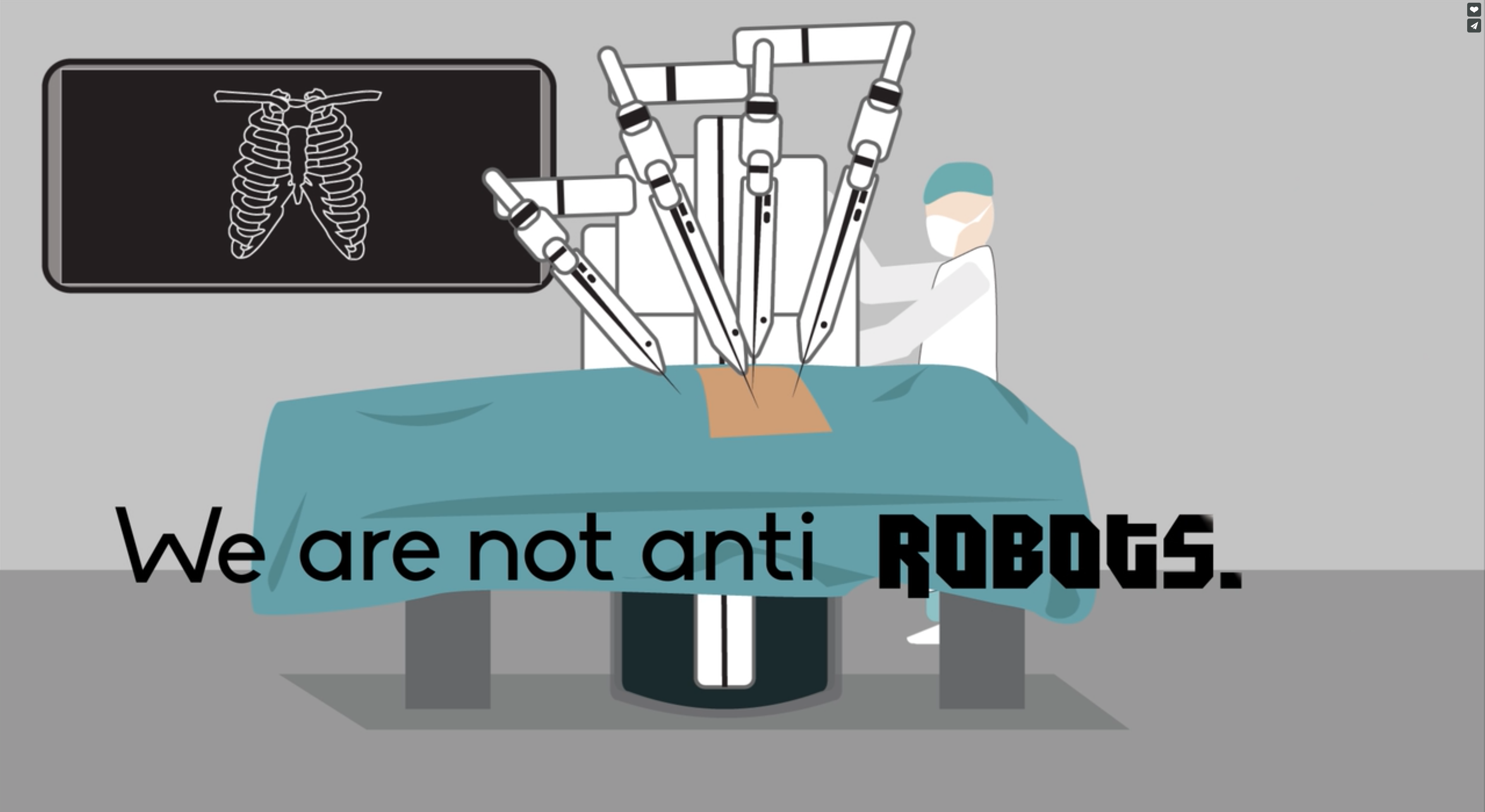ICRAC works for the regulation of robotic weapon systems and is committed to the peaceful use of robotic technology. To further pursue this latter goal, ICRAC’s Noel Sharkey co-founded the Foundation for Responsible Robotics. In a recently published piece on Research Fortnight, Sharkey and Aimee van Wynsberghe write: The robotics revolution will have a disruptive […] Continue Reading
Archive | News
ICRAC and the responsible robotics revolution
Posted on 28 January 2016 by Frank Sauer
Comments Off on ICRAC and the responsible robotics revolution

ICRAC Video: Peaceful Uses of Robotics and Banning LAWS
Posted on 12 November 2015 by Peter Asaro
Stop the Killer Robots from Kamille Rodriguez on Vimeo. The video explains that a ban on killer robots would not have negative impacts on the development of other robotics applications and research. It was created for ICRAC by digital animation artist Kamille Rodriguez: http://www.kamillerodriguez.com/ Continue Reading
Comments Off on ICRAC Video: Peaceful Uses of Robotics and Banning LAWS

Icelandic research institute shuns autonomous weapons
Posted on 02 September 2015 by nsharkey
The Icelandic Institute for Intelligent Machines (IIIM) has issued an ethical policy that makes them the first Artificial Intelligence research and development group to reject the development of technologies intended for military operations. IIIM is an independent research institute affiliated with Reykjavik University in Reykjavik, Iceland “It is only fitting that a research center in Iceland […] Continue Reading
Comments Off on Icelandic research institute shuns autonomous weapons

Tags: Ban Ki-moon, Campaign to Stop Killer Robots, CCW, Convention on Certain Conventional Weapons, Human Rights Watch, International Committee for Robot Arms Control, international humanitarian law, Killer Robots, LAWS, Lethal Autonomous Weapons Systems, Marten's Clause, Model United Nations, NMUN, Pace University, United Nations
Model United Nations Urges Ban on Killer Robots
Posted on 06 April 2015 by mbolton
UN Secretary Ban Ki-moon “energized” by students’ “serious discussions” on autonomous weapons systems In less than two weeks, diplomats from around the world will gather at the United Nations in Geneva to discuss potential global regulations on “lethal autonomous weapons systems” that would be able to select and attack targets without direct human control. But […] Continue Reading
Comments Off on Model United Nations Urges Ban on Killer Robots

Our robotic future: The hopes and worries of 10 year old Bethany
Posted on 21 March 2015 by Frank Sauer
Ten year old Bethany Clifford-Tait is concerned about a future that includes autonomous weapons systems aka ‘killer robots’. Such were her worries that she wrote to the producers of the oldest and most popular BBC children’s programme Blue Peter to ask them to spread the word to other children across the country in one of […] Continue Reading
Comments Off on Our robotic future: The hopes and worries of 10 year old Bethany
ICRAC welcomes UN CCW decision for 2015 Expert Meeting on LAWS
Posted on 14 November 2014 by Frank Sauer
ICRAC welcomes the decision by the 2014 UN CCW High Contracting Parties Meeting to keep discussing “lethal autonomous weapon systems” (LAWS). From the Campaign to Stop Killer Robots Website: The decision is an important acknowledgement of the legal, technical, ethical, operational, and societal concerns that have been raised. The broad consensus expressed for continuing the talks shows […] Continue Reading
Comments Off on ICRAC welcomes UN CCW decision for 2015 Expert Meeting on LAWS
Canada’s leading robot company rejects ‘killer robots’ — updated!
Posted on 14 August 2014 by nsharkey
Hi-Tech Canadian Robotics company, Clearpath, today issued a statement pledging not to manufacture autonomous weapons systems despite their commercial advantage and they urged other companies to follow suit: “those who might see business opportunities in this technology to seek other ways to apply their skills and resources for the betterment of humankind.” ICRAC applauds the […] Continue Reading
Comments Off on Canada’s leading robot company rejects ‘killer robots’ — updated!
Is Russia Leading the World to Autonomous Weapons?
Posted on 06 May 2014 by Mark Gubrud
The short answer is no. But Russia is testing and may deploy at its ICBM bases a lethal mobile system which has “automatic and semi-automatic control modes.” Additionally, Deputy Prime Minister Dmitry Rogozin has recently called for “robotic systems that are fully integrated in the command and control system, capable not only to gather intelligence […] Continue Reading
Comments Off on Is Russia Leading the World to Autonomous Weapons?
Tags: Article 36, Artificial Intelligence, Autonomous Weapons Systems, Campaign to Stop Killer Robots, CCW, Convention on Certain Conventional Weapons, ICRAC, International Committee for Robot Arms Control, Killer Robots, LARs, Lethal Autonomous Robots, Matthew Bolton, military robots, Pace University, Robotics, Scientists Call
ICRAC Delivers Statement to States Parties to the Convention on Conventional Weapons at the UN in Geneva
Posted on 14 November 2013 by mbolton
International Community Must Act Now to Ensure Combat Will Never Be Outsourced to “Killer Robots”! — I am speaking on behalf of the International Committee for Robot Arms Control (ICRAC), a founding NGO member of the Campaign to Stop Killer Robots. Since its establishment in 2009, ICRAC has urged the international community to discuss the […] Continue Reading
Comments Off on ICRAC Delivers Statement to States Parties to the Convention on Conventional Weapons at the UN in Geneva
News Roundup: Banning Lethal Autonomous Robots
Posted on 31 October 2013 by Frank Sauer
Over the last couple of months, lethal autonomous robots (LARs) went from a sidelined issue to not only a hotly and widely debated topic but most importantly an official item of United Nations (UN) arms control diplomacy. This post provides an overview over recent media coverage as well as events and statements given at the UN. The […] Continue Reading
Comments Off on News Roundup: Banning Lethal Autonomous Robots






